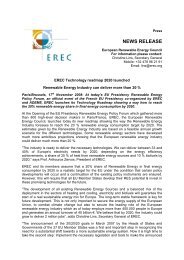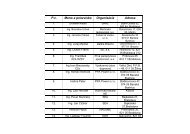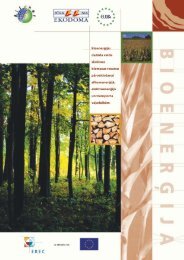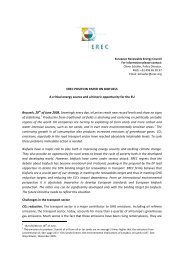CTO Assessment - European Commission
CTO Assessment - European Commission
CTO Assessment - European Commission
You also want an ePaper? Increase the reach of your titles
YUMPU automatically turns print PDFs into web optimized ePapers that Google loves.
CONCLUSIONS OF THE EUROPEAN CONFERENCE “RENEWABLES 2004” - BERLIN<br />
Sharing Skills and Achievements to foster Renewable Energy Development in Europe<br />
The following text is the result of presentations and debates<br />
that took place during the Conference “Renewables 2004”,<br />
within the specific session dedicated to the <strong>CTO</strong>.<br />
The “<strong>European</strong> Conference for Renewable Energy – Intelligent<br />
Policy Options” is organised at the end of the Campaign for Take-<br />
Off, the ambitious public awareness campaign launched by the<br />
<strong>European</strong> <strong>Commission</strong> in 1999 to foster the development of renewable<br />
energy sources in Europe.<br />
The Campaign for Take-Off sets quite ambitious targets for each<br />
of the renewable energy sectors to serve as benchmarks for decision<br />
makers and planners, to disseminate successful initiatives in<br />
Europe, to spread best-practice and raise critical awareness of<br />
decision makers at local, regional, national and <strong>European</strong> level.<br />
The Campaign for Take-Off was a co-ordinated tool to implement<br />
recent EU legislation affecting renewable energy development,<br />
such as:<br />
- White Paper “Energy For the Future: Renewable Sources of<br />
Energy”<br />
- Green Paper: Towards a <strong>European</strong> strategy for the security of<br />
energy supply<br />
- Directive on the Promotion of Electricity produced from Renewable<br />
Energy Sources<br />
- Directive on the energy performance of buildings<br />
- Directive for the Promotion of biofuels’ use for transport<br />
It was designed to act as a catalyst for the development of promising<br />
key sectors in the field of renewable energy sources. At the<br />
end of the Campaign, it is evident that the set objectives were<br />
reached or even surpassed in some sectors (wind, PV), whereas<br />
others are still lagging behind (solar thermal, biomass). Wind, for<br />
example, reached the <strong>CTO</strong> target of “10,000 MW” already in<br />
2000.<br />
In the context of the Campaign for Take-Off, the activities to be<br />
implemented in these key sectors were, since the beginning, classified<br />
according to: regional level, local, city, isolated or rural areas,<br />
national, industry and island as well as “100 community” types<br />
in three levels - rural, island and city.<br />
125 renewable energy programmes and projects involving more<br />
than 700 partner organisations in the <strong>European</strong> Union and in<br />
Accession Countries have joined the Campaign for Take-Off as<br />
Renewable Energy Partners in 2000–2003 and thereby expressed<br />
openly their willingness to contribute to its objectives. These lighthouse<br />
initiatives serve as credible pacemakers showing to other<br />
communities the right way towards a sustainable energy future.<br />
Accordingly, the <strong>CTO</strong> Session at the Berlin conference was structured<br />
as follows:<br />
Panel 1a: Experience in the utilisation of Renewable Energy Sources<br />
in cities – How feasible is it to develop Renewable Energy generation<br />
in an urban environment?<br />
Panel 1b: Renewable Energy Sources deployment at regional and<br />
local level – From dependency to security of supply: How far and<br />
fast can regions improve their energy mix?<br />
Panel 1c: Paving the way towards 100 % Renewable Energy based<br />
communities & islands: utopia or ambitious reality?<br />
In each of these panels, high-level panellists contributed with their<br />
experience and know-how to identify the key-elements for successful<br />
RES implementation in the respective areas. They discussed<br />
the motivations and difficulties encountered in the implementation<br />
of renewable energy projects as well as shared lessons<br />
learnt with the conference delegates.<br />
The discussions clearly showed the importance of the regional and<br />
local level as due to their decentralised nature, many renewable<br />
energy technologies can be particularly well promoted on these<br />
levels.<br />
Furthermore, it was well illustrated that in order to further promote<br />
renewable energy sources and demand-side management,<br />
integrated energy planning incorporating a mix of legal, regulatory,<br />
financial, communication and training measures is crucial.<br />
Apart from environmental considerations, a decentralised sustainable<br />
energy policy can have major impacts on employment,<br />
social cohesion, participation of civil society and economic development.<br />
In islands and remote rural communities, which are often confronted<br />
with high costs or a lack of conventional resources and<br />
the related environmental problems, 100 % RES solutions are<br />
being successfully developed to guarantee security of supply and<br />
contribute to the protection of the environment as well as economic<br />
welfare.<br />
The analysed cases all demonstrate that integrated policies and<br />
concepts aiming at increasing the share of renewable energy<br />
sources in combination with a conscious application of leading<br />
energy efficiency measures in the various end-use sectors are the<br />
most successful. Recent <strong>European</strong> legislation in the energy field,<br />
such as the Directive on the Energy Performance of Buildings,<br />
pushes forward this integrated approach.<br />
Any further action or campaign should therefore reflect this integrated<br />
approach and cover both the demand and supply side. The<br />
newly launched “Public Awareness Campaign for an Energy Sustainable<br />
Europe” will embrace both energy efficiency and renewable<br />
energies and will allow partners to join the common effort of<br />
implementing programmes and initiatives in Europe and beyond.<br />
38 Achivements and lessons


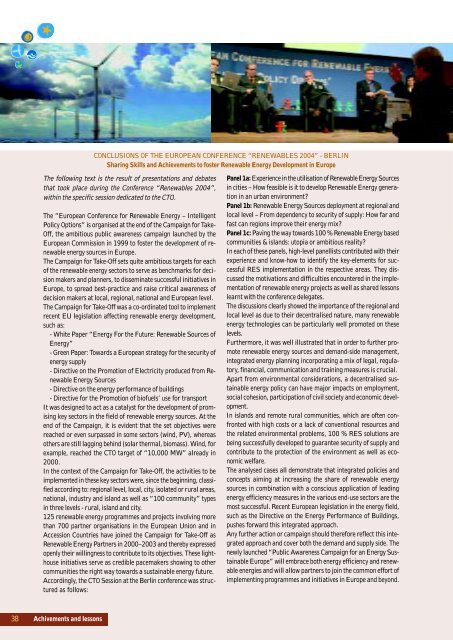
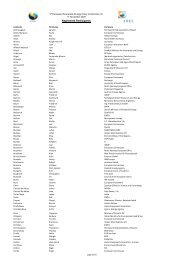
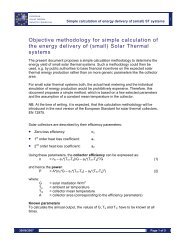

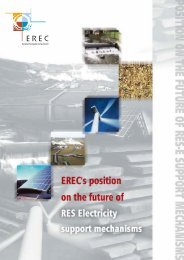
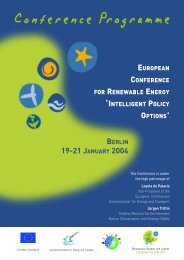
![Energy [R]evolution - Greenpeace](https://img.yumpu.com/47174859/1/184x260/energy-revolution-greenpeace.jpg?quality=85)
